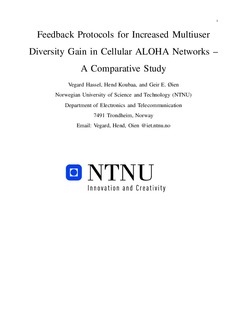Feedback Protocols for Increased Multiuser Diversity Gain in Cellular ALOHA Networks: A Comparative Study
Research report
Permanent lenke
http://hdl.handle.net/11250/2368836Utgivelsesdato
2007Metadata
Vis full innførselSamlinger
Sammendrag
Multiuser diversity (MUD) underlies much of the recent work on scheduling design in wireless networks. This form of diversity can for example be exploited by opportunistically scheduling the mobile user with the best channel quality. In cellular networks exploiting MUD, the base station collects channel state information (CSI) from the mobile users. The process of obtaining CSI will be performed within a guard time, and the length of this guard time will depend on the feedback protocol implemented. In this context, it has already been shown that by applying multiple carrier-to-noise ratio thresholds, the number of mobile users giving feedback can be significantly decreased. However, it has not been evaluated how the algorithm in can be implemented in protocols for real-life networks. In this paper we analyze feedback protocols for reducing the guard time and resolving the feedback contention problem in a cellular, slotted ALOHA-based network. We propose three new feedback protocols based on the algorithm in and we develop closed-form expressions for the guard time duration and the system spectral efficiency of these protocols. We also compare the three new protocols with the Splitting algorithm proposed by Qin and Berry and a new and modified version of this algorithm. Plots show that the spectral efficiency in an IEEE 802.11 network can increase significantly for a high number of users when the Modified Splitting algorithm is used.
